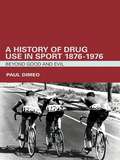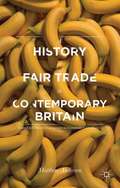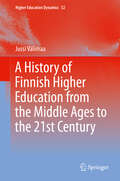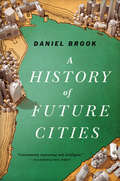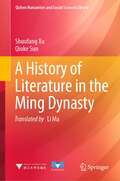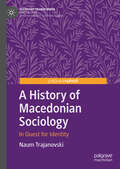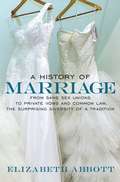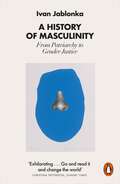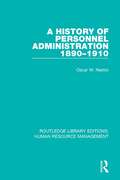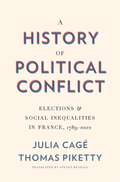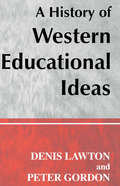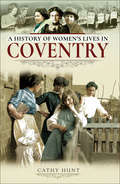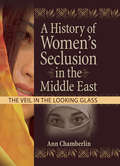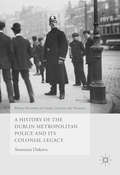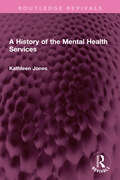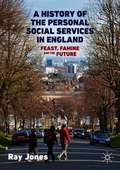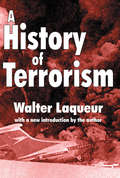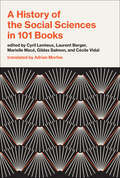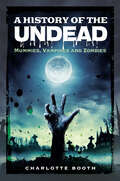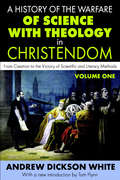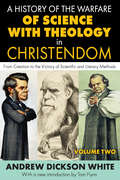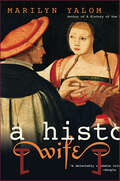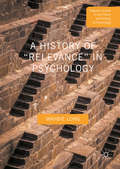- Table View
- List View
A History of Drug Use in Sport: Beyond Good and Evil
by Paul DimeoThis book offers a new history of drug use in sport. It argues that the idea of taking drugs to enhance performance has not always been the crisis or ‘evil’ we now think it is. Instead, the late nineteenth century was a time of some experimentation and innovation largely unhindered by talk of cheating or health risks. By the interwar period, experiments had been modernised in the new laboratories of exercise physiologists. Still there was very little sense that this was contrary to the ethics or spirit of sport. Sports, drugs and science were closely linked for over half a century. The Second World War provided the impetus for both increased use of drugs and the emergence of an anti-doping response. By the end of the 1950s a new framework of ethics was being imposed on the drugs question that constructed doping in highly emotive terms as an ‘evil’. Alongside this emerged the science and procedural bureaucracy of testing. The years up to 1976 laid the foundations for four decades of anti-doping. This book offers a detailed and critical understanding of who was involved, what they were trying to achieve, why they set about this task and the context in which they worked. By doing so, it reconsiders the classic dichotomy of ‘good anti-doping’ up against ‘evil doping’. Winner of the 2007 Lord Aberdare Literary Prize for the best book in British sports history.
A History of Fair Trade in Contemporary Britain: From Civil Society Campaigns To Corporate Compliance
by Matthew AndersonThis book offers an original contribution to the empirical knowledge of the development of Fair Trade that goes beyond the anecdotal accounts to challenge and analyse the trading practices that shaped the Fair Trade model. Fair Trade represented a new approach to global trade, corporate social responsibility and consumer politics.
A History of Finnish Higher Education from the Middle Ages to the 21st Century (Higher Education Dynamics #52)
by Jussi VälimaaThis book unravels the origins, continuities, and discontinuities of Finnish higher education as part of European higher education from the Middle Ages to the 21st century. It describes the emergence of universities in the Middle Ages and the Finnish student, and moves on to the Reformation and the end of Swedish rule. It then discusses the founding of the Royal Academy of Turku, its professors and governing bodies, its role as a community, student numbers, the research and controversies. Travelling through the age of autonomy, the first decades of independence and the Second World War, the book examines the expansion of higher education, the development of the system, and the establishment of polytechnics. It concludes by analysing the multiple institutional and organisational layers of Finnish higher education. Altogether, the book offers an historical study that shows how and why education and higher education have been important in the process of making the Finnish nation and nation state.
A History of Future Cities
by Daniel BrookOne of The Washington Post's "Favorite Books of 2013" A pioneering exploration of four cities where East meets West and past becomes future: St. Petersburg, Shanghai, Mumbai, and Dubai. Every month, five million people move from the past to the future. Pouring into developing-world "instant cities" like Dubai and Shenzhen, these urban newcomers confront a modern world cobbled together from fragments of a West they have never seen. Do these fantastical boomtowns, where blueprints spring to life overnight on virgin land, represent the dawning of a brave new world? Or is their vaunted newness a mirage? In a captivating blend of history and reportage, Daniel Brook travels to a series of major metropolitan hubs that were once themselves instant cities-- St. Petersburg, Shanghai, and Mumbai--to watch their "dress rehearsals for the twenty-first century." Understanding today's emerging global order, he argues, requires comprehending the West's profound and conflicted influence on developing-world cities over the centuries. In 1703, Tsar Peter the Great personally oversaw the construction of a new Russian capital, a "window on the West" carefully modeled on Amsterdam, that he believed would wrench Russia into the modern world. In the nineteenth century, Shanghai became the fastest-growing city on earth as it mushroomed into an English-speaking, Western-looking metropolis that just happened to be in the Far East. Meanwhile, Bombay, the cosmopolitan hub of the British Raj, morphed into a tropical London at the hands of its pith-helmeted imperialists. Juxtaposing the stories of the architects and authoritarians, the artists and revolutionaries who seized the reins to transform each of these precociously modern places into avatars of the global future, Brook demonstrates that the drive for modernization was initially conflated with wholesale Westernization. He shows, too, the ambiguous legacy of that emulation--the birth (and rebirth) of Chinese capitalism in Shanghai, the origins of Bollywood in Bombay's American-style movie palaces, the combustible mix of revolutionary culture and politics that rocked the Russian capital--and how it may be transcended today. A fascinating, vivid look from the past out toward the horizon, A History of Future Cities is both a crucial reminder of globalization's long march and an inspiring look into the possibilities of our Asian Century.
A History of Literature in the Ming Dynasty (Qizhen Humanities and Social Sciences Library)
by Shuofang Xu Qiuke SunThis book explores poems, novels, legends, operas and other genres of writing from the Ming Dynasty. It is composed of two parts: the literary history; and comprehensive reference materials based on the compilation of several chronologies. By studying individual literary works, the book analyzes the basic laws of the development of literature during the Ming Dynasty, and explores the influences of people, time, and place on literature from a sociological perspective. In turn, it conducts a contrastive analysis of Chinese and Western literature, based on similar works from the same literary genre and their creative methods. The book also investigates the relationship between literary theory and literary creation practices, including those used at various poetry schools. In closing, it studies the unique aesthetic traits of related works. Sharing valuable insights and perspectives, the book can serve as a role model for future literary history studies. It offers a unique resource for literary researchers, reference guide for students and educators, and lively read for members of the general public.
A History of Macedonian Sociology: In Quest for Identity (Sociology Transformed)
by Naum TrajanovskiThis book is the first English-language monograph about the institutional development of sociology in (North) Macedonia. It maps and discusses the contexts, goals, and merits of the pioneering attempts for sociological research in the interwar period, early post-war educational and publishing politics, the institutionalization of sociology in socialist Macedonia in the course of the 1960s, its cross-national exchanges, as well as its major trajectories and debates up until the present days. Against the backgrounds of the political and intellectual histories of Yugoslav and post-Yugoslav Macedonia, it argues that the development of the sociological activities, themes, and arguments is entwined with the Macedonian nation- and state-building.
A History of Marriage: From Same Sex Unions to Private Vows and Common Law, the Surprising Diversity of a Tradition
by Elizabeth AbbottWhat does the "tradition of marriage" really look like? In A History of Marriage, Elizabeth Abbott paints an often surprising picture of this most public, yet most intimate, institution. Ritual of romance, or social obligation? Eternal bliss, or cult of domesticity? Abbott reveals a complex tradition that includes same-sex unions, arranged marriages, dowries, self-marriages, and child brides. Marriage--in all its loving, unloving, decadent, and impoverished manifestations--is revealed here through Abbott's infectious curiosity.
A History of Masculinity: From Patriarchy to Gender Justice
by Ivan Jablonka'Exhilarating . . . a work of scholarship, but also inspiration. . . Go and read Jablonka and change the world' Christina Patterson, Sunday Times'An unexpected bestseller in France. . . it has sparked conversations' ChallengesA highly acclaimed, bestselling work from one of France's preeminent historiansWhat does it mean to be a good man? To be a good father, or a good partner? A good brother, or a good friend? In this insightful analysis, social historian Ivan Jablonka offers a re-examination of the patriarchy and its impact on men. Ranging widely across cultures, from Mesopotamia to Confucianism to Christianity to the revolutions of the eighteenth century, Jablonka uncovers the origins of our patriarchal societies. He then offers an updated model of masculinity based on a theory of gender justice which aims for a redistribution of gender, just as social justice demands the redistribution of wealth. Arguing that it is high time for men to be as involved in gender justice as women, Jablonka shows that in order to build a more equal and respectful society, we must gain a deeper understanding of the structure of patriarchy - and reframe the conversation so that men define themselves by the rights of women. Widely acclaimed in France, this is an important work from a major thinker.
A History of Personnel Administration 1890-1910 (Routledge Library Editions: Human Resource Management)
by Oscar W. NestorThis study, first published in 1986, examines and evaluates the personnel techniques and activities that were characteristic of one period in American industrial life. In later years these techniques and activities came to be known as personnel management or personnel administration. By these terms is meant the policies, procedures, and programs that were introduced by companies for the purpose of bringing about constructive and harmonious relationships between management and its own employees. This title will be of interest to students of business studies and human resource management.
A History of Political Conflict: Elections and Social Inequalities in France, 1789–2022
by Thomas Piketty Julia CagéA pioneering history of voting and inequality, drawing on an unprecedented data set covering more than two centuries of sociological findings.Who votes for whom and why? Julia Cagé and Thomas Piketty comb through more than two hundred years of data from some 36,000 French municipalities to show how inequality has shaped the formation of political coalitions, with stark consequences for economic and political development.Cagé and Piketty argue that today’s tripartite division of French political life—a competition among a bourgeois central bloc and distinct factions of the urban and rural working classes—has a precise, and revealing, historical analogue. To understand contemporary tensions, we can look to the end of the nineteenth century and the beginning of the twentieth, another period when runaway economic inequality produced such a three-way rivalry. Cagé and Piketty show that tripartition has always been unstable, whereas the binary political conflict enabled by relative equality and typical of most of the twentieth century facilitated social and economic progress. Comparing these configurations over time helps us envisage possible trajectories for the French political system in the coming decades.With its many changes in governmental structure since 1789, France is an ideal laboratory for studying the vicissitudes of modern political life in general, and electoral democracy in particular. Using France as a model, A History of Political Conflict offers a powerful framework for understanding the complex project of building and sustaining democratic majorities.
A History of Prejudice
by Gyanendra PandeyThis is a book about prejudice and democracy, and the prejudice of democracy. In comparing the historical struggles of two geographically disparate populations - Indian Dalits (once known as Untouchables) and African Americans - Gyanendra Pandey, the leading subaltern historian, examines the multiple dimensions of prejudice in two of the world's leading democracies. The juxtaposition of two very different locations and histories, and within each of them of varying public and private narratives of struggle, allows for an uncommon analysis of the limits of citizenship in modern societies and states. Pandey, with his characteristic delicacy, probes the histories of his protagonists to uncover a shadowy world where intolerance and discrimination are part of both public and private lives. This unusual and sobering book is revelatory in its exploration of the contradictory history of promise and denial that is common to the official narratives of nations such as India and the United States and the ideologies of many opposition movements.
A History of Western Educational Ideas (Woburn Education Series)
by Professor Peter Gordon Professor Denis LawtonIt is important that all those concerned with education - parents, teachers, administrators and policymakers - should have a reasonable understanding of the present system and how it has developed, sometimes over a period of many years. This work traces the development of Western educational ideas from the Greek society of Socrates, Plato and Aristotle, to the ideas and ideologies behind some of the controversial issues in education today.This book discusses the continuous development of educational thought over three millennia. The focus upon the history of ideas in this volume is partly an attempt to move history of education away from an approach based on 'great men' to technological, economic and political influences on ideas and beliefs. It reviews many issues, ranging from the purposes of education from the earliest times, to the challenge of postmodernism in the present century. The authors provide an accessible and thought-provoking guide to the educational ideas that underlie practice.
A History of Women's Lives in Coventry
by Cathy HuntCathy Hunt examines the lives of Coventry women throughout one extraordinary century of change. The result of her detailed research is a book packed with stories of what it was like to be a woman between 1850 and 1950.During these years, women broke through barriers so that future generations of women might experience greater freedoms than had ever been possible for their mothers. Others offered their time and exceptional talents for the good of the community.The main focus of this engaging study is on the too often neglected details of womens daily lives, of triumphs and tragedies, changes and continuities, loves and losses. What was it like to grow up in Coventry, to go to its schools, to work in its offices, shops and factories? What were womens experiences of getting married, setting up home and raising children? How did women spend their scarce and precious leisure time?In other words, this is a book about the business of being a woman in this distinctive English Midlands city.
A History of Women's Seclusion in the Middle East: The Veil in the Looking Glass
by J Dianne Garner Linn PrentisLearn how the seclusion of women can be used as a feminist defense against exploitation-and as an empowering forceInternationally acclaimed author Ann Chamberlin&’s book, A History of Women&’s Seclusion in the Middle East: The Veil in the Looking Glass is a critical interdisciplinary examination of the practice of seclusion of women throughout the Middle East from its beginnings. This challenging exploration discusses the reasons that seclusion may not be as oppressive as is presently generally accepted, and, in fact, may be an empowering force for women in both the West and East. Readers are taken on a controversial, belief-bending journey deep into the surprising origins and diverse aspects of female seclusion to find solid evidence of its surprising use as a defense against monolithic cultural exploitation. The author uses her extensive knowledge of Middle Eastern culture, language, and even archeology to provide a convincing assertion challenging the Western view that seclusion was and is a result of women&’s oppression. A History of Women&’s Seclusion in the Middle East goes beyond standard feminist rhetoric to put forth shocking notions on the real reasons behind women&’s seclusion and how it has been used to counteract cultural exploitation. The book reviews written evidence, domestic and sacred architecture, evolution, biology, the clan, the environment for seclusion, trade, capital and land, slavery, honor, and various other aspects in a powerful feminist argument that seclusion is actually a valuable empowering force of protection from the influence of today&’s society. The text includes thirty black and white figures with useful descriptions to illustrate and enhance reader understanding of concepts.A History of Women&’s Seclusion in the Middle East discusses at length: prehistoric evidence of seclusion the sense of honor in the Middle East a balanced look at the Islamic religion the true nature of the harem the reasons for the oppression by the Taliban the positive aspects of &’veiling&’ seclusion as a defense against capitalist exploitation and other challenging perspectives!A History of Women&’s Seclusion in the Middle East is thought-provoking, insightful reading for all interested in women&’s history, feminism, and the history and culture of the Middle East.
A History of the Dublin Metropolitan Police and its Colonial Legacy (World Histories of Crime, Culture and Violence)
by Anastasia DukovaThis book illuminates the neglected history of the Dublin Metropolitan Police - a history that has been long overshadowed by existing historiography, which has traditionally been preoccupied with the more radical aspects of Irish history. It explores the origins of the institution and highlights the Dublin Metropolitan Police's profound influence on the colonial forces, as its legacy reached some of the furthest outposts of the British Empire. In doing so Anastasia Dukova provides much needed nuance and complexity to our understanding of Ireland as a whole, and Dublin in particular, demonstrating that it was far more than a lawless place ravaged by political and sectarian violence. Simultaneously, the book tells the story of the bobby on the beat, the policeman who made the organisation; his work and day, the conditions of service and how they affected or bettered his lot at home and abroad.
A History of the Mental Health Services: A Revised History Of The Mental Health Services - From The Early 18th Century To The 1990s (Routledge Revivals)
by Kathleen JonesFirst published in 1972, A History of the Mental Health Services is a revised and abridged version of both Lunacy, Law and Conscience and Mental Health and Social Policy, rewriting the material from the end of the Second World War to the passing of the Mental Health Act 1959, and adding a new section which runs from 1959 to the Social Services Act 1970. The story starts with the first legislative mention of the ‘furiously and dangerously mad’ as a class for whom some treatment should be provided, traces the development of reform and experiment in the nineteenth century, and the creation of the asylum system, and ends in the age of Goffman and Laing and Szasz with the virtual disappearance of the system. The book will be of interest to students of mental health, sociology, social policy, health policy and law.
A History of the Personal Social Services in England: Feast, Famine and the Future
by Ray JonesThis book provides a detailed narrative and analysis of the 50-year development of the personal social services in England, located throughout the changing ideological, political and relevant professional contexts of the period. Drawing on the experience and recollections of key players who were active during major moments, it constitutes a significant addition to the social work and social policy literature, synthesising important and often original evidence, and some provocative interpretations. The book speaks to crucial on-going issues and contentious current debates, such as the place of bureaucratic management structures in ‘practices with people' generally, and social work specifically. It will be of interest to student and qualified social workers, social policy students and researchers, and policy makers, as well as those with a general interest in the history and trajectory of current issues facing social work and social care in England.
A History of the Polish Americans: A History Of The Polish-americans (Minorities In Modern America Ser.)
by John.J. BukowczykIn the last, rootless decade families, neighborhoods, and communities have disintegrated in the face of gripping social, economic, and technological changes. Th is process has had mixed results. On the positive side, it has produced a mobile, volatile, and dynamic society in the United States that is perhaps more open, just, and creative than ever before. On the negative side, it has dissolved the glue that bound our society together and has destroyed many of the myths, symbols, values, and beliefs that provided social direction and purpose. In A History of the Polish Americans, John J. Bukowczyk provides a thorough account of the Polish experience in America and how some cultural bonds loosened, as well as the ways in which others persisted.
A History of the Social Sciences in 101 Books
by Cécile Vidal Laurent Berger Cyril Lemieux Marielle Macé Gildas SalmonAn intellectual history of the social sciences that offers a library of 101 books that broke new ground for the field.What are the social sciences? What unifies them? This essay collection seeks to answer these and other important questions as it considers how the field has developed over the years, from post–World War II to the present day throughout the world. Edited by Cyril Lemieux, Laurent Berger, Marielle Macé, Gildas Salmon, and Cécile Vidal, A History of the Social Sciences in 101 Books brings together a diverse range of researchers in the social sciences to present short essays on 101 books—both renowned and lesser known—that have shaped the field, from Theodor Adorno and Max Horkheimer&’s Dialectic of Enlightenment (1947) to Michel Aglietta&’s Money: 5000 Years of Debt and Power (2016).While there have been surveys and intellectual histories of particular disciplines within the social sciences (history, anthropology, sociology), until now there has been no intellectual history of the social sciences as a unified whole. Far from presenting a fixed and frozen canon, A History of the Social Sciences in 101 Books offers instead a moving, multiform landscape with no settled questions, only an ongoing series of new perspectives and challenges to previously established grounding.
A History of the Undead: Mummies, Vampires and Zombies
by Charlotte BoothA history of Western culture’s fascination with undead creatures in film and television.Are you a fan of the undead? Watch lots of mummy, zombie and vampire movies and TV shows? Have you ever wondered if they could be “real?”This book, A History of the Undead, unravels the truth behind these popular reanimated corpses.Starting with the common representations in Western media through the decades, we go back in time to find the origins of the myths. Using a combination of folklore, religion and archaeological studies we find out the reality behind the walking dead. You may be surprised at what you find . . .
A History of the Undead: Mummies, Vampires and Zombies
by Charlotte BoothA history of Western culture’s fascination with undead creatures in film and television.Are you a fan of the undead? Watch lots of mummy, zombie and vampire movies and TV shows? Have you ever wondered if they could be “real?”This book, A History of the Undead, unravels the truth behind these popular reanimated corpses.Starting with the common representations in Western media through the decades, we go back in time to find the origins of the myths. Using a combination of folklore, religion and archaeological studies we find out the reality behind the walking dead. You may be surprised at what you find . . .
A History of the Warfare of Science with Theology in Christendom: Volume 1, From Creation to the Victory of Scientific and Literary Methods
by Andrew WhiteGiven the powerful and forthright title of Andrew Dickson White's classic study, it is best to make clear his own sense of the whole as given in the original 1896 edition: "My conviction is that science, though it has evidently conquered dogmatic theology based on biblical texts and ancient modes of thought, will go hand in hand with religion, and that although theological control will continue to diminish, religion as seen in the recognition of a 'power in the universe, not ourselves, which makes for righteousness' and in the love of God and of our neighbor, will steadily grow stronger and stronger, not only in the American institutions of learning, but in the world at large." White began to assemble his magnum opus, a two volume work first published in 1896 as A History of the Warfare of Science with Theology in Christendom. In correspondence he wrote that he intended the work to stake out a position between such religious orthodoxy as John Henry Newman's on one side and such secular scoffing as Robert Ingersoll's on the other. Historian Paul Carter declared that this book did as much as any other published work "toward routing orthodoxy in the name of science." Insofar as science and religion came to be widely viewed as enemies, with science holding the moral high ground, White inadvertently, became one of the most effective and influential advocates for unbelief.
A History of the Warfare of Science with Theology in Christendom: Volume 2, From Creation to the Victory of Scientific and Literary Methods
by J.M. CohenGiven the powerful and forthright title of Andrew Dickson White's classic study, it is best to make clear his own sense of the whole as given in the original 1896 edition: "My conviction is that science, though it has evidently conquered dogmatic theology based on biblical texts and ancient modes of thought, will go hand in hand with religion, and that although theological control will continue to diminish, religion as seen in the recognition of a 'power in the universe, not ourselves, which makes for righteousness' and in the love of God and of our neighbor, will steadily grow stronger and stronger, not only in the American institutions of learning, but in the world at large." White began to assemble his magnum opus, a two volume work first published in 1896 as A History of the Warfare of Science with Theology in Christendom. In correspondence he wrote that he intended the work to stake out a position between such religious orthodoxy as John Henry Newman's on one side and such secular scoffing as Robert Ingersoll's on the other. Historian Paul Carter declared that this book did as much as any other published work "toward routing orthodoxy in the name of science." Insofar as science and religion came to be widely viewed as enemies, with science holding the moral high ground, White inadvertently, became one of the most effective and influential advocates for unbelief.
A History of the Wife
by Marilyn Yalom“A valentine to wives . . . after reading Yalom's history, one thing is clear: marriage is not for the faint-hearted.” —USA TodayHow did marriage, considered a religious duty in medieval Europe, become a venue for personal fulfillment in contemporary America? How did the notion of romantic love, a novelty in the Middle Ages, become a prerequisite for marriage today? And, if the original purpose of marriage was procreation, what exactly is the purpose of marriage for women now?Combining “a scholar's rigor and a storyteller's craft” (San Jose Mercury News), distinguished cultural historian Marilyn Yalom charts the evolution of marriage in the Judeo-Christian world through the centuries and shows how radically our ideas about marriage have changed.For any woman who is, has been, or ever will be married, this intellectually vigorous and gripping historical analysis of marriage sheds new light on an institution most people take for granted, and that may, in fact, be experiencing its most convulsive upheaval since the Reformation.“Scholarly yet delectably readable volume.” —People“Yalom’s sweeping history not only offers a clear overview of the role of the wife over the centuries but also recounts the experiences of specific individuals.” —Los Angeles Times“Packed with rich material.” —The New York Times Book Review“Portrays the gradual but relentless shift from subjugation toward partnership . . . collating what information is available about how women have spent, and felt about, their married lives.” —Chicago Tribune“Yalom’s brilliant deconstruction of the married state for women is at once reassuring and shocking . . . perfectly fascinating.” —Diane Johnson, New York Times–bestselling author of Le Divorce
A History of “Relevance” in Psychology (Palgrave Studies in the Theory and History of Psychology)
by Wahbie LongThis book represents the first attempt to historicise and theorise appeals for ‘relevance’ in psychology. It argues that the persistence of questions about the ‘relevance’ of psychology derives from the discipline’s terminal inability to define its subject matter, its reliance on a socially disinterested science to underwrite its knowledge claims, and its consequent failure to address itself to the needs of a rapidly changing world. The chapters go on to consider the ‘relevance’ debate within South African psychology, by critically analysing discourse of forty-five presidential, keynote and opening addresses delivered at annual national psychology congresses between 1950 and 2011, and observes how appeals for ‘relevance’ were advanced by reactionary, progressive and radical psychologists alike. The book presents, moreover, the provocative thesis that the revolutionary quest for ‘social relevance’ that began in the 1960s has been supplanted by an ethic of ‘market relevance’ that threatens to isolate the discipline still further from the anxieties of broader society. With powerful interest groups continuing to co-opt psychologists without relent, this is a development that only psychologists of conscience can arrest.
